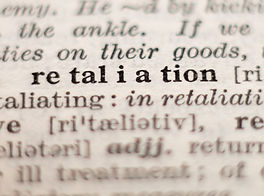

Unlawful Workplace Retaliation in Hawaii
Although employees may witness their supervisors and employers discriminating against others based on protected categories, they might be hesitant to report the incident for fear of retaliation. Speaking up against your boss can be the hardest thing to do. Thankfully there are laws which protect workers who stand up to their employers when it comes to discrimination. When you assert a legal right, report discriminatory conduct, submit a complaint, participate in an investigation, or particpate in any protected activity, then our laws protect you from adverse action including certain forms of mistreatment, demotion, and termination.
Identifying Unlawful Retaliation
It's important to highlight that not all employer conduct done in retaliation is unlawful.
There is a difference between awful conduct (which may be permissible) and unlawful conduct (dicrimination based on protected categories).
You should first try to identify whether adverse action was taken against you for an activity which is protected by law. Here are some examples of awful conduct which may indicate a bad boss, but may not necessarily raise a legal claim.
-
An employee is demoted or terminated because:
-
The employer didn't like the employee's work-product;
-
The worker complained about something that is not protected (e.g. unhappy with management, bad scheduling, unreasonable sales objectives, being micro-managed, understaffing, etc.); or
-
The worker reported something to HR that is not related to a protected category (e.g. being singled out because of a lack of education, being targeted for not hanging out with the team, losing a promotion to a boss' son or daughter, etc.)
-
Here are some examples of protected activity which employers cannot retaliate against:
-
Submitting a complaint about discrimination on a protected category;
-
Submitting a complaint about Sexual Harassment;
-
Submitting a complaint about illegal activity in the Workplace;
-
Filing a complaint against the company with the Equal Employment Opportunity Commission (EEOC) or the Hawaii Civil Rights Comisssion (HCRC);
-
Refusing to do something illegal;
-
Submitting a complaint about not getting paid proper wages;
-
Requesting a reasonable accomodation for a disability; or
-
Submitting a witness statement about discrimination based on a protected category
What can you do?
If your employer has taken adverse actions against you based on a protected category, your next steps will depend on whether you have been terminated or still remain on the job.
If you're still employed:
-
Follow the company's internal protocols for submitting complaints;
-
Make sure that your complaint is submitted in writing;
-
Your written complaint should be worded as polite as can be (avoid lashing out) and specifically identify the relevant type(s) of discrimination under the protected categories;
-
Be the best employee you can be. Do not give your employer a reason to fire you; and
-
Finally, document everything that happens. A successful case will depend in large part on a clear timeline of events
-
If your complaint is not appropriately addressed, consider filing a complaint with the Federal Equal Employment Opportunity Commission (EEOC) or the Hawaii Civil Rights Commission (HCRC).
-
If you need additional assistance, or have questions, feel free to contact the Sapolu Law Office or submit a message below to schedule a free case evaluation.
If you were discharged or terminated from employment:
-
Call an attorney as soon as possible;
-
Do not sign any waivers or severance documents which may prevent you from filing a claim.
-
If the company insists that you sign their paperwork, ask for more time to consult an attorney. At a minimum, you could always say "I need some time to review this with my family and will get back to you within a few days." Then make sure you follow up with an attorney.
-
